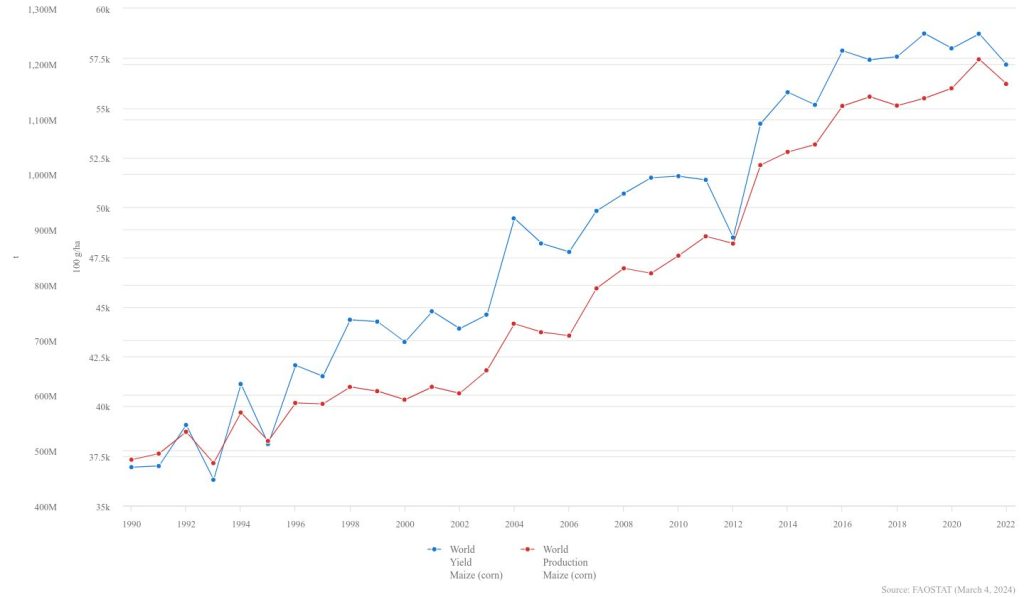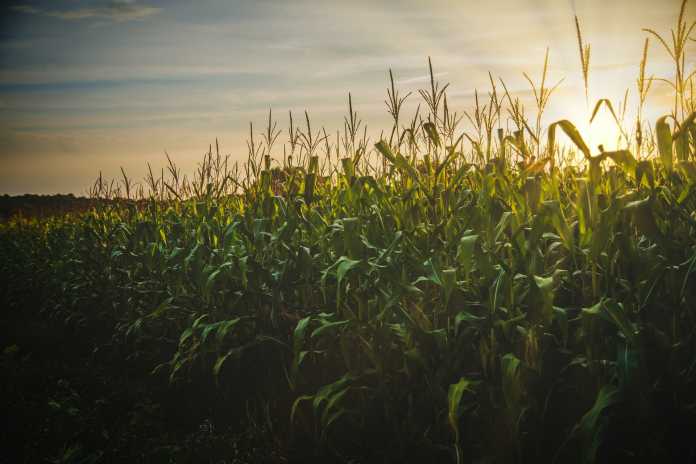PBS News Weekend claimed in a recent video, “How climate change is disrupting the global food supply,” that climate change will harm the global food supply in the future, but this unlikely. The claim is refuted by food production trends over recent decades of warming, and an understanding of agronomy.
This PBS piece, hosted by John Yang, is unusual in that the guest on the program, Jonas Jägermeyr, a climate scientist from Columbia University and the NASA Goddard Institute for Space Studies, admitted that carbon dioxide is positively affecting plant growth.
Jägermeyr told PBS that the three main drivers for crop production are temperature, precipitation, and the presence of atmospheric carbon dioxide. So far, so good. Where Jägermeyr’s argument falls apart is when he follows that statement up with the claim that recent warming creates “extreme events such as droughts, heat waves[…] hail, and flooding,” which impact agriculture negatively.
Available data do not show increases in any of those extreme weather categories. As Climate Realism has covered in greater detail before: although everyplace has drought periodically, there is no evidence droughts are getting worse or more becoming more frequent; heatwaves are not becoming more severe; hail has been decreasing in the United States at least since 2005. Even the Intergovernmental Panel on Climate Change does not claim that flooding is getting worse due to climate change.
He goes on to admit that carbon dioxide is needed and loved by crop plants, albeit to different degrees, but then makes the puzzling statement that corn or maize does not benefit greatly from additional CO2 fertilization, and is “really seeing the largest negative impact.”
Pulling up the data from the United Nations Food and Agriculture Organization on corn production and yield, it is unclear what negative impact Jägermeyr is referring to. Over the past three decades, which is supposed to be the most intense period of warming, corn production has steadily climbed worldwide.
Since just 1990, worldwide:
- Corn production has increased by 140 percent;
- Yield has increased by 54 percent. (see the figure, below)

Despite admitting that “climate change isn’t just a negative blanket of adverse impacts,” Jägermeyr gave himself cover from his climate science peers by saying “we want to be really careful because potential positive or potential gains are difficult to realize.” That’s clearly false. By contrast, it seems that negative trends fairly attributable to climate change are almost impossible to identify.
One particularly puzzling claim made during the PBS interview, was that accelerated plant growth due to CO2 fertilization will “dilute” the nutritional quality of crops, because “the protein content, micronutrients such as zinc and vitamins and iron, these components aren’t taken up, aren’t produced by the crop at the same pace they’re growing.” This, Jägermeyr says, raises concerns about global nutrition. This claim is not new, and it is just as lame as it has always been.
The argument relies on the assumption that all other metrics – fertilizer, soil mineral content, et cetera—will stay constant amid increased CO2 fertilization. So, although more crops are produced on the same amount of land, it is dividing the same quantity of available micronutrients between them. If this was a real unsolvable problem, greenhouse operators who grow tomatoes and other vegetables in CO2-enriched atmospheres, sometimes upwards of thousands of PPM, would be producing significantly less nutritious produce. They are not, so what is the secret? Adding enough nutrients back to the soil in the form of fertilizers.
There are other factors to consider as well, such as the variety of the crop being grown, because not all wheat species, for example, have the same nutritional value in the first place.
Jägermeyr told PBS that poorer countries have a harder time adapting or handling extreme weather events when they do happen, which is true, but that’s true whether or not climate change has a net-negative impact on weather.
All things considered, the modest warming and especially the increased carbon dioxide in our atmosphere has increased crop yields, a trend which should continue in the future. Fearmongering about diluted micronutrients and future scenarios have not presented themselves outside of computer models. Thus, hyping such as yet imaginary fears, as PBS does, is counterproductive at best. Shame on PBS for hyping alarming, unverified claims of climate harm, while downplaying the good news about crop production.


















Typical article from PBS have to stay true to their mission to make sure CO2 is never given full credit or their whole narrative of global catastrophe due to climate change would be fall apart like a house of cards! CO2 is expelled by living creatures and absorbed by plants as the natural cycle in nature. Why crops would not benefit from increased CO2 levels is not a surprise! Of course all plant life benefits just as biological life benefiting from oxygen given up by plants! It’s called ecosystems, maybe they need a refresher course!